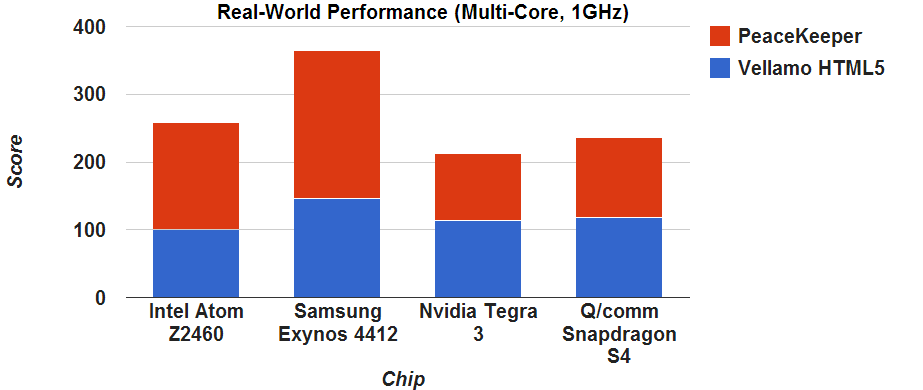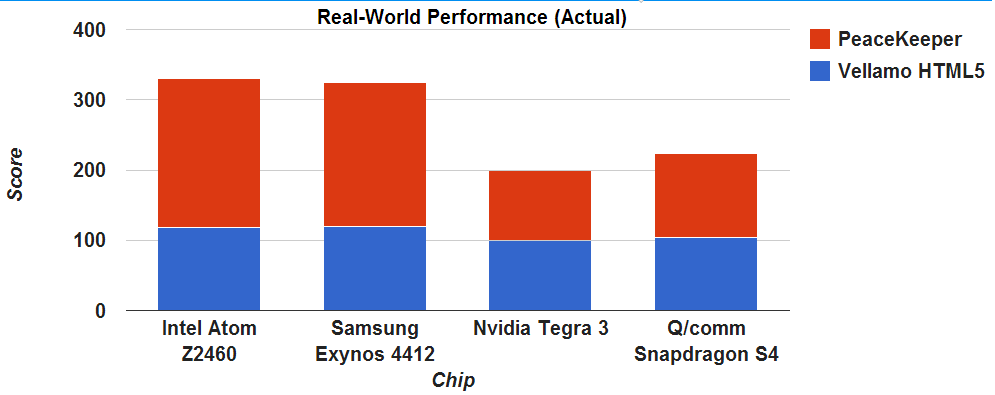Smartphone processor head-to-head: Intel Atom vs Nvidia Tegra 3 vs Samsung Exynos vs Qualcomm Snapdragon
We run the four processors through a battery of benchmarks to find out which one can claim to be the best overall...

Real-world Tests
Unlike the synthetic testing, the real-world results don't correct for the number of cores - although the adjusted scores do scale down for a theoretical 1GHz implementation to level the playing field. The score is achieved by combining the results of two popular real-world benchmarking packages, Qualcomm's own Vellamo and Futuremark's Peacekeeper. Both measure performance on common web browsing tasks - one of the main functions of a smartphone.

This time the results delivered less of a surprise. Samsung's Exynos chip proved the fastest on test, easily outpacing its rivals in both the PeaceKeeper and Vellamo tests.
Coming up close behind was Intel's Atom, which even when robbed of its 2GHz clock-speed advantage shone in the in-browser PeaceKeeper benchmark testing. This is more evidence that Intel is onto something with its Atom architecture, and ARM's various licensees should watch out.
Nvidia's Tegra 3 placed bottom this time, with the Peacekeeper testing in particular performing extremely slowly. Without the advantage of a 1.5GHz clock speed, the graphics giant's design just doesn't measure up to the competition.
Qualcomm's Snapdragon S4 Pro proved distinctly middling too, performing well on the Vellamo test - created, it must be noted, by Qualcomm's own software engineering division - but failing to make much of an impact on third-party PeaceKeeper test.

Looking at the actual in-handset performance, rather than a theoretical 1GHz implementation, things are close at the top end: here Intel's clock-speed advantage pips the Exynos 4412 to the post. At the bottom end Nvidia still trails behind even Qualcomm's surprisingly slow Snapdragon S4 Pro.
Get the ITPro daily newsletter
Sign up today and you will receive a free copy of our Future Focus 2025 report - the leading guidance on AI, cybersecurity and other IT challenges as per 700+ senior executives
Gareth Halfacree is an experienced tech journalist and IT professional, and has been writing since 2006. In addition to contributing article for ITPro, Gareth has been featured in publications such as PC Pro, Techmeme, The Register, The MagPi, and Tom’s Hardware.
In addition to his digital articles, Gareth is the author of several best-selling books. These include the Raspberry Pi User Guide, an essential text for those looking to get started with their Raspberry Pi, as well as The Official Raspberry Pi Beginner’s Guide. Gareth also wrote the Official BBC micro:bit User Guide, a comprehensive guide to setting up the pocket-sized computer, learning to code on it, and even creating your own hardware addons.
-
 Cleo attack victim list grows as Hertz confirms customer data stolen
Cleo attack victim list grows as Hertz confirms customer data stolenNews Hertz has confirmed it suffered a data breach as a result of the Cleo zero-day vulnerability in late 2024, with the car rental giant warning that customer data was stolen.
By Ross Kelly
-
 Lateral moves in tech: Why leaders should support employee mobility
Lateral moves in tech: Why leaders should support employee mobilityIn-depth Encouraging staff to switch roles can have long-term benefits for skills in the tech sector
By Keri Allan